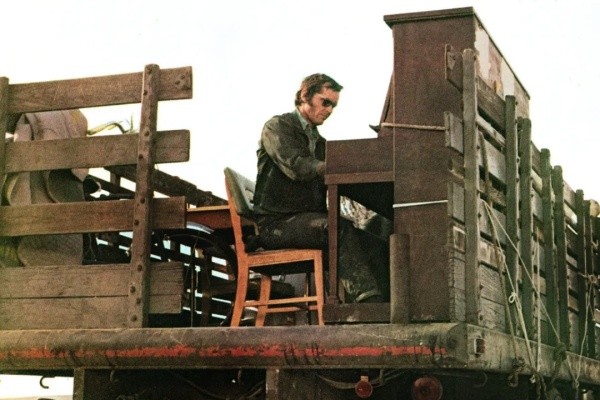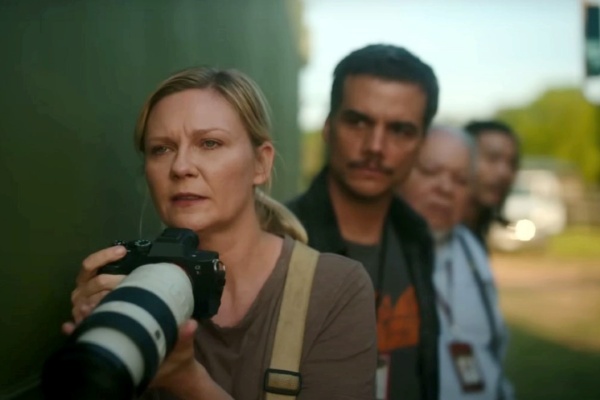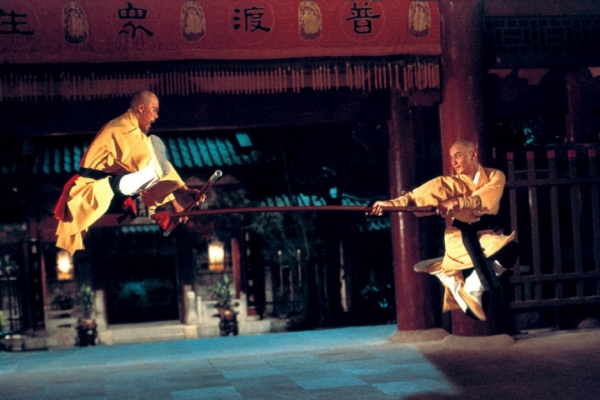![]()
The personal traumas of WWII come back to haunt—if also provide reconciliation—for the characters in this solemn eighth episode of ‘Dekalog’.
Dir. Krzysztof Kieslowski
1988 | Poland/West Germany | Drama | 56 mins | 1.33:1 | Polish
Not rated (likely to be PG13 for some mature themes)
Cast: Maria Koscialkowska, Teresa Marczewska, Tadeusz Lomnicki
Plot: Zofia, a professor of ethics, is visited by Elzbieta, an American researching the fate of Jews who survived World War II. A daytime classroom conversation turns into a night of confrontation, and Zofia is forced to answer for a decision she made decades ago that directly affected the course of Elzbieta’s life. (from The Criterion Collection)
Awards: Won FIPRESCI Prize & Children and Cinema Award (Venice). Official Selection (Cannes).
Source: Telewizja Polska S.A.
Accessibility Index
Subject Matter: Moderate
Narrative Style: Slightly Complex
Pace: Slightly Slow
Audience Type: Slightly Arthouse

Review #1,447
(Reviewed on Criterion Blu-ray – first published 15 May 2017)
Reviews:
Dekalog: One
Dekalog: Two
Dekalog: Three
Dekalog: Four
Dekalog: Five
Dekalog: Six
Dekalog: Seven
Dekalog: Nine
Dekalog: Ten
Spoilers: No
Dekalog: Eight opens with a few shots in the wintry cold, a close-up of a girl holding the hand of an unseen adult. It is an evocation of a distant past that Kieslowski rarely afforded for the entire Dekalog series. The fleeting images, as if they are spectral memories, don’t last more than a minute, but they would later connect in a deep way. This episode shares Dekalog: One’s tonal solemnity, with both films depicting trauma and life’s uncertainties in an unconditional way, bereft of any unnecessary judgment by the filmmakers, even if the characters may take the liberty to judge each other.
Zofia (Maria Koscialkowska) is an elderly ethics professor working in Warsaw. One day, she is visited by a younger Polish-American researcher named Elzbieta (Teresa Marczewska), who asks to sit in her class. A student presents an ethics scenario, which heavily references the events of Dekalog: Two, not before Elzbieta presents one of her own, as she vividly recalls the memories of more than forty years ago.
Thou shalt not bear false witness against thy neighbour.
You could see as she recounts her story that Zofia’s face changes—there’s sadness and guilt in her eyes. Elzbieta was a little Jewish girl that Zofia refused to shelter from the Nazis during WWII. As a staunch Catholic, Zofia could not bear witness to a falsification of one’s religion. Zofia and Elzbieta share a heart-to-heart talk through the night, but one senses that their shared history is merely one of many traumatic stories, most of which had been left untold by countless others who weren’t as fortunate.
The collective Polish psyche in relation to the events of WWII remains plagued by the agony of bad deeds and the anguish of conspiration, intentional or otherwise. Kieslowski envisions Dekalog: Eight as a tale of personal haunting, but also of reconciliation. It is beautifully shot, especially a mysterious midway sequence where Zofia brings Elzbieta to the site of that ‘historical’ night, marked by psychological and emotional pain.
It is intriguing and ironic that Kieslowski punctuates his film with two minor characters—Zofia’s stamp-collecting neighbour, and a young contortionist in the park—both of whom appear unaffected by the war. The neighbour excitedly shows Zofia his German stamps dated 1931, by-passing the war entirely, seemingly with no trace of trauma. Similarly, the contortionist, his body and legs contorted in a fascinatingly grotesque way, shows no sign of physical stress (he urges Zofia to try bending backwards, but she feels the pain), and in the film’s context, suffers no psychological burden—or is it merely an indifference to pain?
Grade: A-
Trailer:
Music:












[…] Dekalog: One Dekalog: Two Dekalog: Three Dekalog: Four Dekalog: Five Dekalog: Six Dekalog: Eight Dekalog: Nine Dekalog: […]
LikeLike
[…] Dekalog: One Dekalog: Two Dekalog: Three Dekalog: Four Dekalog: Five Dekalog: Six Dekalog: Seven Dekalog: Eight Dekalog: […]
LikeLike
[…] Dekalog: One Dekalog: Two Dekalog: Three Dekalog: Four Dekalog: Five Dekalog: Six Dekalog: Seven Dekalog: Eight Dekalog: […]
LikeLike
[…] Dekalog: One Dekalog: Two Dekalog: Three Dekalog: Four Dekalog: Five Dekalog: Seven Dekalog: Eight Dekalog: Nine Dekalog: […]
LikeLike
[…] Dekalog: One Dekalog: Two Dekalog: Three Dekalog: Four Dekalog: Six Dekalog: Seven Dekalog: Eight Dekalog: Nine Dekalog: […]
LikeLike
[…] Dekalog: One Dekalog: Two Dekalog: Three Dekalog: Five Dekalog: Six Dekalog: Seven Dekalog: Eight Dekalog: Nine Dekalog: […]
LikeLike
[…] Dekalog: One Dekalog: Two Dekalog: Four Dekalog: Five Dekalog: Six Dekalog: Seven Dekalog: Eight Dekalog: Nine Dekalog: […]
LikeLike
[…] Dekalog: One Dekalog: Two Dekalog: Three Dekalog: Four Dekalog: Six Dekalog: Seven Dekalog: Eight Dekalog: Nine Dekalog: […]
LikeLike
[…] Dekalog: One Dekalog: Two Dekalog: Three Dekalog: Four Dekalog: Five Dekalog: Six Dekalog: Seven Dekalog: Eight Dekalog: […]
LikeLike